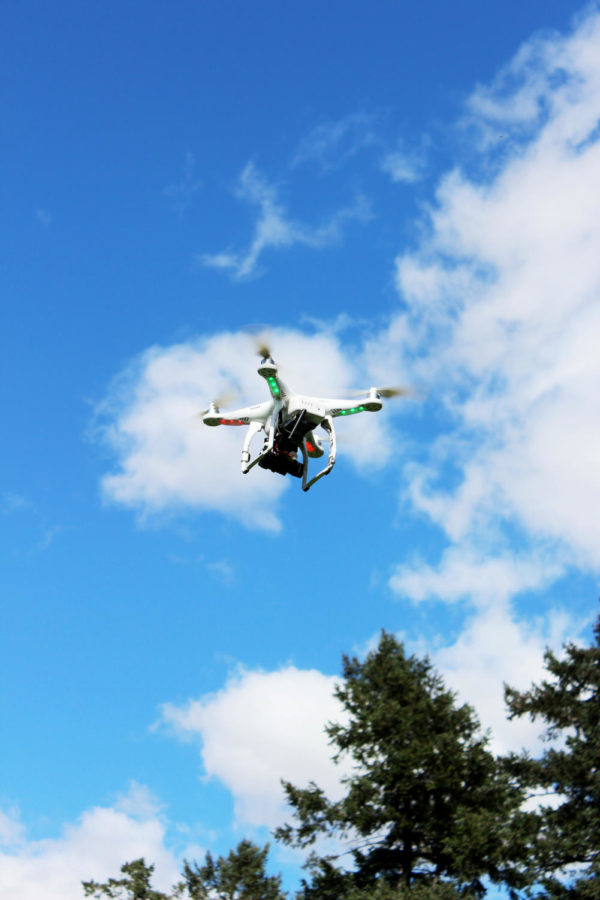Drone usage spikes controversy
Jessica Darland/Iowa State Daily
A drone with a GoPro attached to it flies near the campanile on Oct. 7. The owner of the drone, AJ McNeil, uses it for an internship with Peoples Company for selling farms, development land and houses.
October 9, 2014
On Oct. 8, the Iowa State Daily ran a story about AJ McNeil’s work with People’s Company, a real estate company and land brokerage in Des Moines. McNeil, a senior in public service and administration in agriculture, flies drones over the company’s property.
The Federal Aviation Administration [FAA] considers drones unmanned aircrafts. In the article McNeil and Steve Bruere, president of People’s Company, expressed a lack of knowledge regarding current laws and regulations for flying drones.
According to the United States Code, as of June 23, pilots of unmanned aircrafts must have a certificate of waiver, authorization or airworthiness.
“Basically if you are going to fly a model aircraft or a small unmanned aircraft for hobby or recreation, you don’t need FAA authorization, but you do need to [adhere] to the provisions that are spelled out in that law,” said Les Dorr, spokesman for the FAA’s unmanned aircraft department. “Any other purpose, including using an unmanned aircraft or model aircraft in connection to business, you need FAA authorization.”
As made clear in the article, McNeil, operator of the company drone, has had no license to operate drone aircrafts.
“We figured the rules were not drafted and we were ready to go,” McNeil said. “There were a lot of companies doing it so we went for it.”
The company has been uncertain regarding updates to the laws, Bruere said.
“When we bought the drone there was vagueness in the law around owning drones and flying drones between recreation purpose and commercial purposes,” Bruere said. “We understand that there are penalties and we have been told that there will be further clarity from the FAA as for the use of drones and so while we are waiting for the further clarity we are going to continue to use it how we are using it.”
When People’s Company purchased their drone in May, the law had not been passed. Therefore, no license was needed to obtain and operate a unmanned aircraft. The issue had been an ongoing discussion among legislators and the FAA.
“I guess I just really haven’t been paying attention, really,” Bruere said. “We understood the risk of flying a drone when we bought it.”
In previous cases of flying unmanned aircrafts, the FAA has fined violators up to $10,000. In response to whether or not People’s Company had been up to date drone-usage laws, Bruere’s response was no.
“My understanding of the fine is $10,000, so if we get fined $10,000 then we get fined $10,000,” Bruere said.
While McNeil is still unlicensed, People’s Company will continue to fly the drone without hesitation, Bruere said. However, McNeil said he would not.
“I’m definitely going through the process. I’m going to get a license,” said McNeil. “I feel like it’s good technology, but I feel like we should be legal about it.”
Unmanned aircraft operators can apply to be exempt from regulations. Depending on what applications are requested, exemptions will only be granted if operation of the drone is low-risk and tightly controlled, is not hazardous to property on the ground, is in the national interest and does not pose a threat to national security.
As of June 2, the FAA had received approximately 69 requests for exemption. Only six of them have been granted in thus far.
As the discussion of unmanned aircrafts continues, the FAA will continue to specify laws.
“We have been for the last couple of years working on a proposal that will address operations of small unmanned aircrafts–small being under 55 pounds,” Dorr said. “We hope to get that out by the end of this year.”
People’s Company, who is currently flying against FAA policy, recognizes the future of unmanned aircraft regulations.
“I think the laws and regulations will continue to evolve,” Bruere said. “From my understanding there are several studies being commissioned right now around this topic. It’s a big issue and there will be time to redirection soon. I just don’t feel [what] they have today is what we will end up with.”







